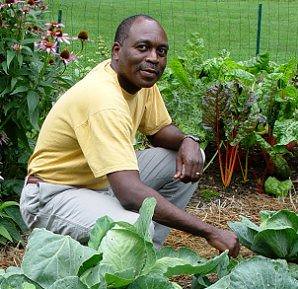
Nearly 17 million (14.6%) children in the United States live in households that are food insecure, meaning that at some point during the year, they do not get enough nutritious food to eat at home. Many Americans, especially those in rural, minority, and lower-income neighborhoods, have poor access to healthy, affordable foods like fresh fruits and vegetables. Through Let’s Move Faith and Communities, First Lady Michelle Obama has challenged community leaders to create 10,000 places—like gardens, farmers markets, and community supported agriculture sites—where communities can access fresh produce locally.
Unfortunately, fresh produce is not always so easy to come by. And many of our nation’s hungriest households who rely on local food pantries to help feed their families also have special difficulty accessing fresh, local fruits and vegetables. That’s why Master Gardener Gary Oppenheimer created a novel solution to this dilemma: AmpleHarvest.org, an organization that connects the excess food grown in home and community gardens to local food pantries eager for fresh produce. Bill Hoffman, Program and Analysis Specialist in the National Institute of Food and Agriculture’s Office of the Director, believes in the power of Gary’s work to bring fresh produce to hungry families:
“Among the 95,000 active extension master gardeners in the US, he has probably done the most to give hungry people access to fresh fruits and vegetables. Connecting gardeners to food pantries was a stroke of genius and vision on Gary’s part.”
The First Lady’s challenge inspired AmpleHarvest.org to partner with USDA’s Center for Faith-Based and Neighborhood Partnerships to better enable pantries to offer freshly harvested garden produce to their clients. With partnership from USDA’s Master Gardeners Program and the Center, AmpleHarvest.org has registered nearly 4,000 food pantries across all 50 states as fresh food access points. AmpleHarvest.org’s website quotes the First Lady’s goal to promote fruits and vegetables, and Gary is committed to the cause: “We’re going to make a best effort to help reach Michelle Obama’s 10,000 goal by striving to register between 4,500 and 5,000 pantries by the end of the year.”

Providing fresh produce to local food pantries supports a key aspect of the Let’s Move! initiative: helping every family access healthy, affordable food. AmpleHarvest.org enables people to help their neighbors in need by reaching into their own backyards. And people are excited about the results! The Community Resources Center Food Pantry in California reported: “Within one hour of registering Community Resource Center on the Ample Harvest website I received a call from a local family of four with ten orange trees. I spoke with the mother of the family and she said that until she heard of AmpleHarvest.org, her family was spending time cleaning up rotten fruit off the ground. Now her family can spend time harvesting fruit to give to low income families in their community. Since speaking with her, she has dropped off eight large bags full of locally grown oranges.”
If you would like to partner with Let’s Move Faith and Communities to increase fresh food access in your community, contact the USDA Center for Faith-Based and Community Partnerships at collaborate@usda.gov.
